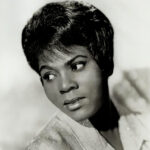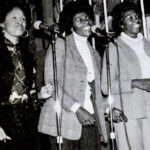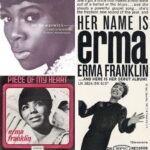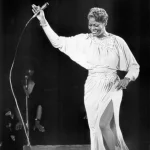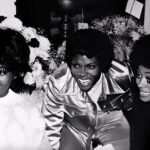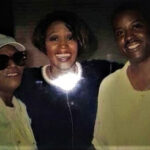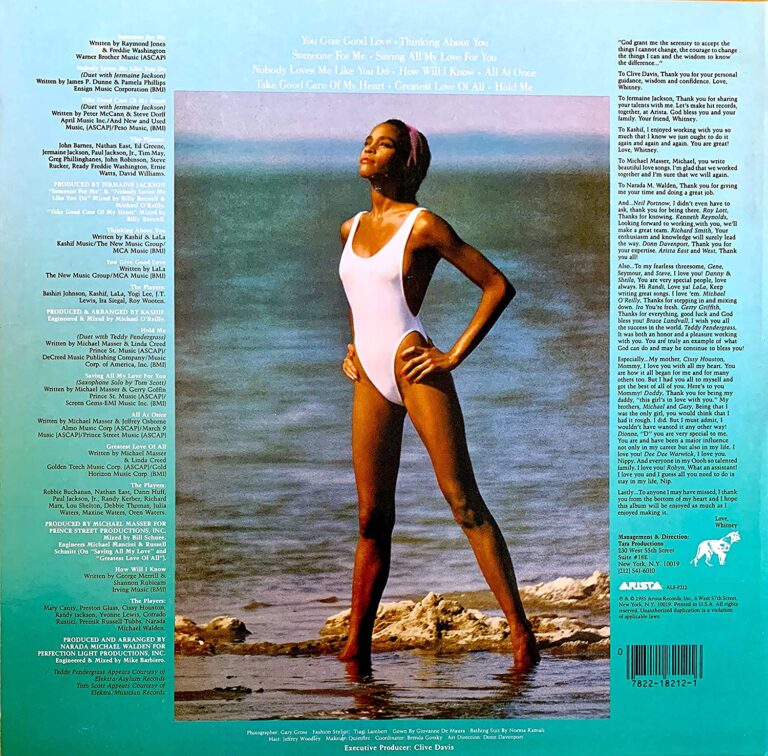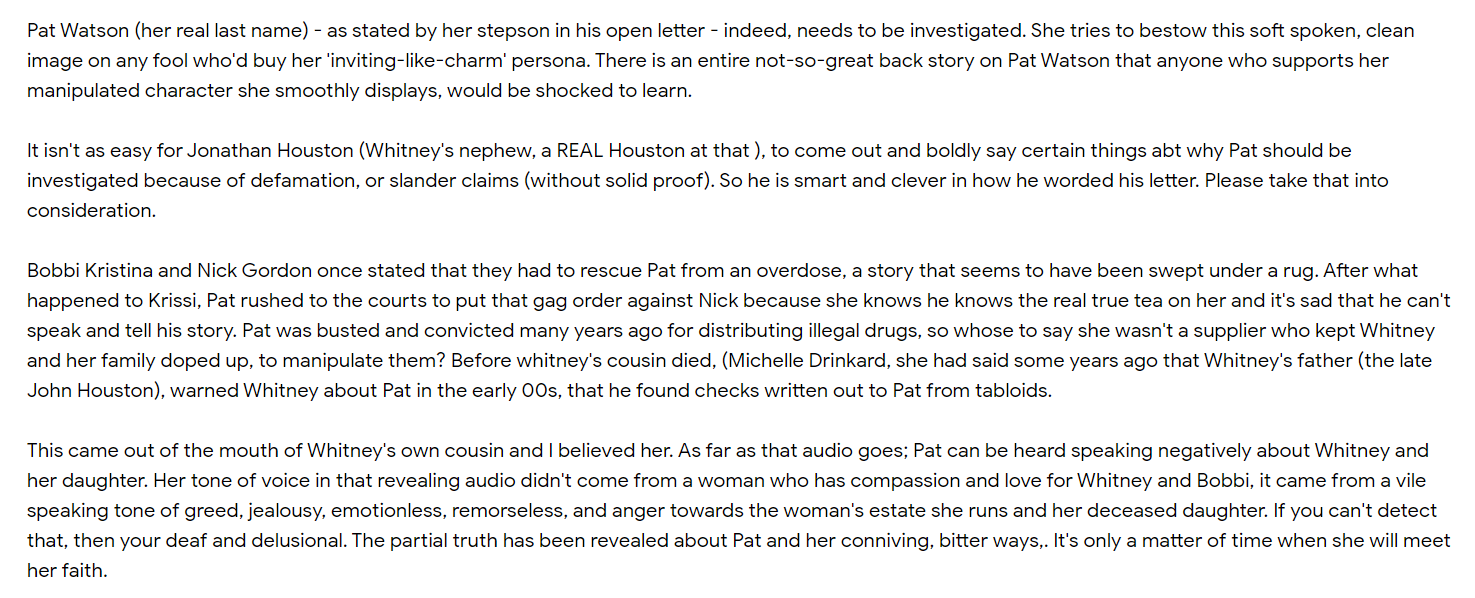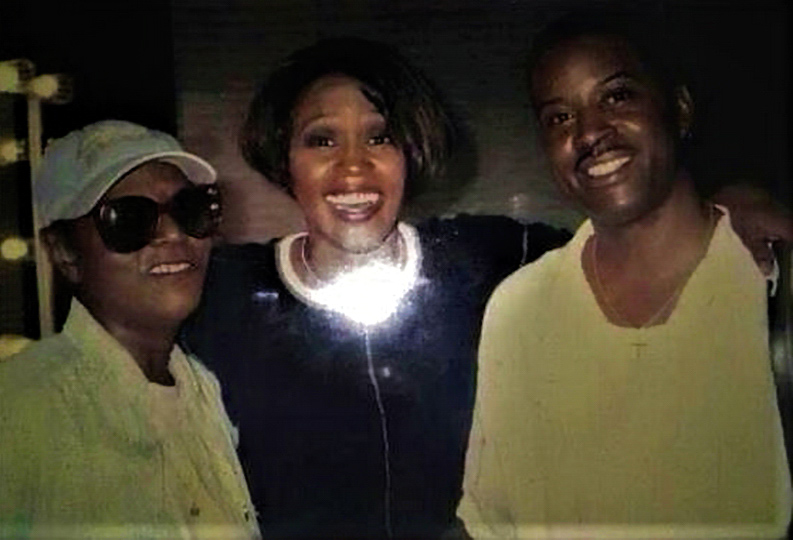
Dee Dee Warwick: The Troubled, Talented Cousin Who May Have Ruined Whitney Houston’s Life

*I know that Dee Dee really wants to protect her honor and good name and asks you to pay attention to her music, but not to the monstrous lies.
Whitney Houston’s legacy shines so brightly that her dazzling background can easily be forgotten. But when Houston first emerged, poodle-permed, in the spotlight, she was the latest offering from a New Jersey family that had been shaping the US gospel, R&B and pop scene for decades.
The daughter of Cissy Houston, the god-daughter of Darlene Love and the cousin of Dionne Warwick, Houston was born into a family that had long made the transition from church choirs to pop charts look easy.
The relative who held most influence over her, however, has become a footnote in musical history. Dee Dee Warwick, Dionne’s little sister and a woman destined to spend her life trying to step out of her shadow, was a two-time Grammy nominee and, Dionne maintained, the singer in the family.
Whitney’s vocal inspiration and confidante, Dee Dee was 18 years her senior and, it has been claimed in a new documentary, the younger star’s abuser.
Made with the full cooperation of the late singer’s family, Kevin Macdonald’s film ‘Whitney‘ shows Houston’s brother Gary Garland giving a first-hand account of being molested between the ages of 7 and 9 by a female relative. His story is subsequently confirmed by Whitney’s assistant Mary Jones (She is also Pat’s cousin), who says that Whitney told her the same thing: “Mary, I was too. It was a woman.” (Mary did small errands and cooked soups. Robyn said that Whitney didn’t have private conversations with the staff) She then confirms the abuser’s name: Dee Dee Warwick.
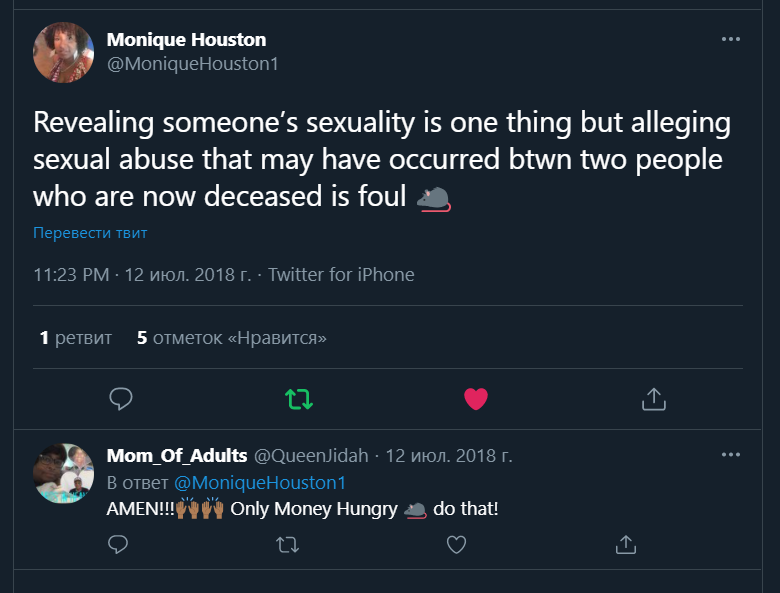
Mary Jones goes on to explain that what happened to Houston “made her question her sexual preference”, leading in turn to her unhappy marriage to Bobby Brown, to her struggles with mental health, and to the drug habit that would cause her to die in a hotel bathtub at the age of 48. (The Garlands tried to explain romantic relationship between Whitney and Robyn in such a way that Whitney was “abused” and “confused”. Gary is a known homophobe, he was jealous of his first wife Monique for Robyn. 18 years have passed and Gary continues to insult Robyn, what a loser!)
But the film says no more about Dee Dee Warwick, who died in 2008 and so can’t answer the charges. Who was she? (Kevin found one of Dee Dee’s girlfriends to tell her story in this movie, but she refused)
Openly gay in the music industry, and known only as Dionne Warwick’s sister outside of it, Warwick was the toughest daughter of the matriarchal, star-making family – and its least famous creation. Rumored to have struggled with addiction, Warwick suffered from rheumatoid arthritis and diabetes before her death, with her sister – and greatest champion – by her side.
Because while Dionne granted her sister some of her biggest breaks, her fame always made Warwick appear the poor relation. “Your voice is just as great, you’re just as talented, you have everything going for you,” says Darlene Love, a family friend, “but unfortunately, when you’re in somebody else’s shadow, you just never make that crossover.”
“People’s frame of reference was always going to be Dionne,” explains Adam White, author of Motown: The Sound of Young America. “In order for her to get on the radio Dee Dee had to have a really good song otherwise they’d play a Dionne record.”
Both Warwick sisters followed a well-trodden path, girlhoods bathed in gospel music led to adolescences singing in New York’s theatres and young womanhood in recording studios.
Dionne was five years older than Dee Dee. And, crucially, she caught the attention of hitmaker Burt Bacharach in 1962, beginning one of the most prolific musical partnerships of the Sixties.
But Dee Dee, who had also changed her name to Warwick, wasn’t far behind. She made her first record as a solo artist a year later, working with powerhouse producers Jerry Leiber and Mike Stoller. Warwick was 21 when she released, You’re No Good, a swaggering, defiant kiss-off – but sounded like a woman far older.
The song became a hit in November 1963 – but not for Warwick. “She had the bad luck to be covered by Betty Everett,” explains White. Everett was barely a more established star, but her version was more delicate than Warwick’s. She sounded wounded, rather than eviscerating, and was better suited to the pop charts. “You’re No Good epitomizes her very forceful, almost blunt way of singing,” says White, “but it was also going to be old school fairly soon.”
The one consistency in Warwick’s career is that her songs became bigger hits for other people. She was the first to record ‘I’m Gonna Make You Love Me‘, but her yearning and tender rendition was eclipsed by the assertive, winking international hit recorded by Diana Ross.
Even Dionne trumped her: after learning ‘Alfie‘ from Burt and Hal’s original demo, Warwick was the first sister to record it. In the two years it took to get released, Dionne recorded the song in one take and got a Top 5 hit. “Alfie shoes why Dionne attracted more attention,” White says, “She had seized the moment and Dee Dee was always one step behind.” (My guess is that Dionne’s record company, Scepter Records, did not allow Dee Dee’s record to be released. It’s just a very dirty business)
Burt and Hal’s collaboration with Dionne hadn’t only made her a poster girl for R&B’s new pop sound, but had given the older Warwick two devoted champions. “Dee Dee missed having someone who was as invested in her career as she was,” White explains. Instead, Warwick flipped between labels, trying to find the support that could make her a star.
“They just didn’t know where to put her,” Love says, adding that it frustrated Warwick. “She would tell us, ‘I don’t understand what happened to my record label, I don’t know why they’re not working for me, I don’t know why they’re not working as hard for me as they are for Dionne.’”
“I didn’t have the kind of management and direction I needed,” Warwick said in 1975, speaking of her time with Mercury Records. “The record got absolutely nothing – no trade reviews, no promotion whatsoever, so I just figured that we’d better call it a day with the company.” Warwick admitted defeat shortly after, according to Dionne’s autobiography: “Disappointed with the lack of promotion of these wonderful recordings, Dee Dee told me: ‘I’m going to leave the solo recording work to you.’” (Carl Bean, Archbishop, who was Dee Dee’s valet in the 60s, writes in his book that Dee Dee had a little complex about standing in Dionne’s shadow. My opinion is that Dee Dee shouldn’t have been around Dionne at all. Dionne treated her like a competitor. Dionne was Los Angeles and Dee Dee was New York. They were sisters, but as individuals they were different and their music was also different.)
It didn’t help that Warwick wasn’t an easy sell. “We called DeeDee the bad girl,” Love says. “She wouldn’t take nothing off nobody, whatever she wanted to say, or felt like saying, she said it.” “Dee Dee could be quite feisty, she had quite a different personality to her sister. She was a lot more outspoken,” says soul music historian David Nathan. “Dionne’s image has been cultivated as elegant and sophisticated. Dee Dee didn’t attempt to do that and she wasn’t really interested.”
Warwick would adlib lines, much to the ire of songwriters, and channeled earthy emotion through her voice. In what many consider to be her greatest song, ‘Foolish Fool‘, you can hear a woman vocally battling with the musicians around her. “It’s a magnificent piece of work but it’s also deranged,” says White. “She sings the hell out of it. It’s her most powerful record, but pop radio wasn’t going to play a song like that.” (Dee Dee’s strong emotionality was due to the fact that she was deeply in love with Ida Jones, perhaps the producers and her religious family tried to interfere with this relationship. They told her not to be so open)
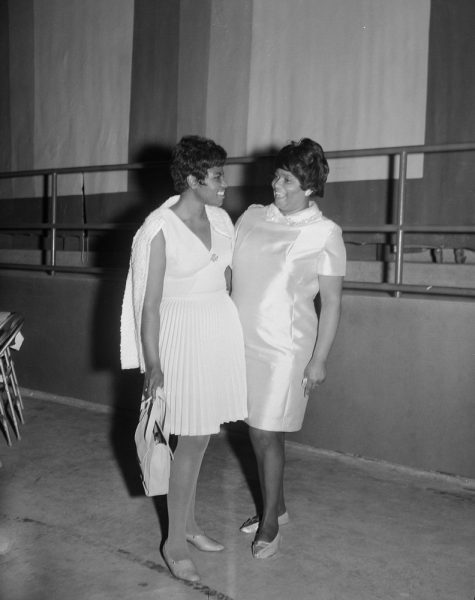
“She was feisty,” recalls Nathan. “It wasn’t a bad thing, but didn’t go well for her with working with record companies and marriages.”
“She never really talked about being married or wanting children,” says Love. But Warwick was occasionally open about her proclivities, saying about Make Love To Me in 1996: “It’s still my favorite on the album because I love being made love to!” Others have said that her version of ‘Don’t You Pay Them No Mind‘ (Dee Dee recorded the original of this song, Nina Simone was a couple of weeks later) was sung with her sexuality – and how brazen she could be about it – in mind.
“Dee Dee was openly lesbian in the music industry,” one anonymous source close to the Warrick family says. “Not necessarily in public, but I don’t think that was a secret within the music industry. And that was a detriment to her development also, because she didn’t hide it within the music industry. She didn’t.”
It also brought her closer to Houston, the insider says. “Whitney felt closer to Dee Dee by virtue of them sharing a similar orientation. It is interesting that there is that connection between them.” (Dee Dee was not involved in Whitney’s career, which was completely controlled by her record company, mother and father. Her support was in the emotional sphere so that Whitney could survive in this difficult and hypocritical business)
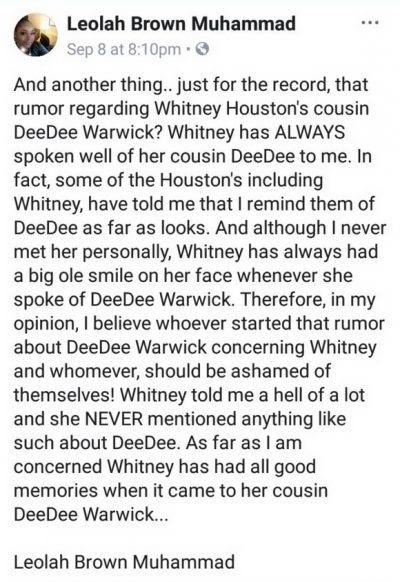
“Whitney did tell me that one of her primary vocal influences was Dee Dee,” says Nathan. “People think it’s usually her mum or her cousin Dionne. But actually, it’s her other cousin.”
But Warwick was always the other cousin, or the other sister. (Cissy Houston was very scared that what happened to Dee Dee’s career would happen to Whitney, if she was as open about herself. In those years, society would not have been ready for the real Whitney Houston. Early death of parents and poverty, Cissy and her sister Lee were strict in raising their children, but they wanted them to succeed in life.) Her solo career was punctuated with spells backing up her Dionne, along with Love and Cissy Houston. She was there until the end, for Dionne’s My Music and Me tour in 2006. “Sometimes it gets a little hard when you have a sister that is as famous as Dionne Warwick was to not get pushed into the background,” says Love. “They expect you to be as great as or be like.” The sisters remained together until Dee Dee’s final breath. (Dee Dee had a stroke, but why she was in a nursing home with so many relatives and not in a hospital or home care ??? Why did Dionne make this decision? Is it all about money?)
In Kevin Macdonald’s film, Mary Jones says that Whitney didn’t tell her mother about the abuse because “she was ashamed”. Cissy can’t have known, she explains, or “she would have done something about it.” Certainly, in her actions towards her cousin, Whitney hid what was is alleged to have happened well. At Dee Dee’s funeral, the singer left her seat to join the choir in a moving rendition of ‘The Lord is My Shepherd‘.
Dee Dee moved to New York in 1961 and Whitney was born in 1963. Dee Dee was born and lived in East Orange and Whitney in Newark. Dee Dee never lived with the Cissy’s kids under the same roof. When Whitney was growing up, Dee Dee wasn’t physically with her. The background vocal group, which also included Cissy Houston, was in huge demand. Dee Dee Warwick was the contractor for their vocal group, so Cissy was always with her. Dee Dee worked very hard during these years, she sang background vocals for over 500 songs for dozens of artists and began her solo career in 1963. Dee Dee was openly gay, her family and producers did not approve of such “behavior”, but she made good money (for example, Berry Gordy from Motown signed her to a contract to work with Mary Wells, Diana Ross and Martha and the Vandellas) and was independent. But due to diabetes and arthritis, she had to return in 90s to the family home in East Orange.
Source: telegraph.co.uk/music/artists/dee-dee-warwick-troubled-talented-cousin-may-have-ruined-whitney/
*The text in turquoise is my personal remarks

